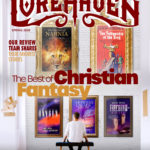Speculative Faith Reading Group 7: Aslan Springs Forth
Last week’s reading group reminded me of why I love the Chronicles of Narnia so much: the stories’ direct showcase of what I can only call serious joy. With so much frivolity about in the world, in stories, and in my own heart, re-beholding this is like hearing a favorite song.
“These are tools not toys,” Father Christmas cautions as he reveals to the children their gifts. The same could be said about this series itself, or any great tale that our Father gives us.
 Does this mean we are not entertained by such gifts or stories? Not at all. And sometimes people (including readers here) have challenged me to fight my impulses to make a story or anything else seem outwardly “useful” to some Duty! By doing this, one hijacks the thing for his own intents, not an author’s and likely not God’s. Yet it’s the arrival of Father Christmas, who here is like a messenger or “prophet” or Aslan, that reminds me of solemn, serious joy.
Does this mean we are not entertained by such gifts or stories? Not at all. And sometimes people (including readers here) have challenged me to fight my impulses to make a story or anything else seem outwardly “useful” to some Duty! By doing this, one hijacks the thing for his own intents, not an author’s and likely not God’s. Yet it’s the arrival of Father Christmas, who here is like a messenger or “prophet” or Aslan, that reminds me of solemn, serious joy.
[Father Christmas] was so big, and so glad, and so real, that they all became quite still. They felt very glad, but also solemn. …
Lucy felt running through her that deep shiver of gladness which you only get if you are being solemn and still. …
“These are your presents … and they are tools not toys.” … Peter was silent and solemn as he received these gifts, for he felt they were a very serious kind of present.
— The Lion, the Witch and the Wardrobe, pages 107-108 (emphases added)

“When they tried to look at Aslan’s face they just caught a glimpse of the golden mane and the great, royal, solemn, overwhelming eyes; and then they found they couldn’t look at him and went all trembly.”
Last Saturday, with help, I hoped to share this Biblical ideal with my church’s real-life reading group: not a the notion of a duty-driven or enforced seriousness, but a joyful and glad solemnity. Can we ever find this holy place of gladness and seriousness, rejecting the notion of turning everything into a “toy”? How do we see this sense in the stories we love?
Somehow this theme seemed even more prevalent as I re-read these two LWW chapters. Watch for this contrast: of the wrong sort of “seriousness” — the manipulative, duty-driven dominance of the Witch — versus the joyful, holy, righteous seriousness that Aslan brings.
Chapter 11: Aslan Is Nearer
- After the first few pages, until the Witch rushes out in her sleigh, how do you feel about Edmund now? Do your thoughts approach “finally he is catching on, just like I did by the end of chapter 4”? Or might you be thinking, “I feel sorry for him; he reminds me of myself when my deceptions run out and I have nowhere else to turn but repentance”?
- Why do you think the Witch stops to find out who gave the part of animals their gifts?
- “What is the meaning of all this gluttony, this waste, this self-indulgence? Where did you get all these things?” (page 115) Is the Witch even partly right in her accusation? Why does she assume this about the beasts? If she’s wrong, what were they really doing?
- How might this be similar to how evil people, or Satan, reacts to good pleasures today? By contrast, how does God view good pleasures, and how should we enjoy them?
- “And Edmund for the first time in this story felt sorry for someone besides himself.” (page 117) How does this make you feel? As this party of animals isn’t mentioned again in the story, what do you think happened to them? Do you believe Aslan later restored them?
- How do you find the pages of description about the arrival of spring? Who is bringing it? (Hint: the chapter title.) What themes might be in the contrast of winter and spring?
Chapter 12: Peter’s First Battle
- The first of this chapter is heavy with descriptions of the world, then of Aslan’s camp, then finally of Aslan himself. Do you tend to read faster during these parts, or slower? Why do you think the author spends more time describing things like this, and less time describing, say, exactly how Peter dresses or what the White Witch’s sleigh looks like?
- Aslan is surrounded by more Narnian creatures, including many we haven’t previously seen, such as centaurs. Which creature or mythical beast do you like best, and why?
- “When they tried to look at Aslan’s face they just caught a glimpse of the golden mane and the great, royal, solemn, overwhelming eyes; and then they found they couldn’t look at him and went all trembly.” (page 126) Why might the author describe Aslan’s appearance and effects this way? How do you think you would feel if you met Aslan like this?
 This is from C.S. Lewis in his nonfiction book Mere Christianity: “God is the only comfort, He is also the supreme terror: the thing we most need and the thing we most want to hide from. He is our only possible ally, and we have made ourselves His enemies. Some people talk as if meeting the gaze of absolute goodness would be fun. They need to think again. They are still only playing with religion.” Do we sometimes “play with religion” and not consider the truth that Christ is “royal, solemn, overwhelming,” making us fear?
This is from C.S. Lewis in his nonfiction book Mere Christianity: “God is the only comfort, He is also the supreme terror: the thing we most need and the thing we most want to hide from. He is our only possible ally, and we have made ourselves His enemies. Some people talk as if meeting the gaze of absolute goodness would be fun. They need to think again. They are still only playing with religion.” Do we sometimes “play with religion” and not consider the truth that Christ is “royal, solemn, overwhelming,” making us fear?- Aslan is fearful and solemn, yet his camp is bright and colorful, filled with expectation and joy. When the children arrive, he claps his paws together and declares a feast — here is another feast in the story. Why all the feasts? How is this also a serious joy?
- Imagine being Peter during the battle. What may you have expected? By contrast, what was the battle truly like? What was Peter’s response? What would yours have been?










































This reinforces the theme that you noted in the last Reading Group column — that the White Which is sort of an anti-Santa. She hijacked and distorted Father Christmas in illegitimate mimicry. She won’t like it that the real Father Christmas has returned.
Perhaps they were giving thanks and rejoicing, partly for what Father Christmas had just given them, but probably more for the apparent end of the Witch’s curse.
I think Lewis would have seen the pattern of winter and spring as Resurrection imagery.
I read slower, trying to piece together the geography in my head and wishing that I was looking at a map. I think this scene is critical to the whole Chronicles, because it establishes the geographic continuity of Narnia. I think descriptions of places may be more important to fantasy in general than they are to other genres; landscapes help create a sense of epic scope and show the wonder of a fantastic world.
I love the way the centaurs are depicted as warrior sages throughout the Chronicles. They get my vote!
It’s interesting that the creatures from Greek mythology that Lewis incorporated into Narnia are shown as Aslan’s natural allies. Dryads, Naiads, and anthropomorphic animals — a sense of naturalism.
It’s reminiscent of how God is described from the human perspective in the Old Testament — too glorious for us to look upon, revealing us completely.
This is another spiritual truth that I think fantasy can help us reclaim better than nonfiction or “realistic” fiction can.
I had not noticed, but there does seem to be a lot of feasting, beginning with the party of animals, but probably actually going back to the dinner with the Beavers. Why all the feasts? Isn’t the Royal Feast archetype supposed to be reserved for the happy ending?
My modern, sinful response (not really a full response, just a thought) at this scene was to wonder why Aslan would prevent his other soldiers from fighting off the wolf. I know Aslan wanted Peter to “earn his spurs,” and I thought that was all fine and good, but I reason that it would not be worth testing Peter’s resolve when doing so could put both Susan and Peter at risk.
There are probably many reasons why that response is wrong, including that dishonor may be worse than death from a medieval or classical mindset. The main reason that it is wrong is because of who Aslan is, even as a not-quite-symbol. Peter or Susan could have gotten hurt, but they did not, because Peter obeyed Aslan, and Aslan knew what he was doing.
Your comment about reverence for God reminds me of the passage in Perelandra where the narrator meets the Eldil of Mars .
As long as what you are afraid of is something evil, you may still hope that the good may come to your rescue. But suppose you struggle through to the good and find that it is also dreadful? How if food itself turns out to be the very thing you can’t eat and home the very place you can’t live, and your very comforter the person who makes you uncomfortable. Then, indeed, there is no rescue possible: the last card has been played.”